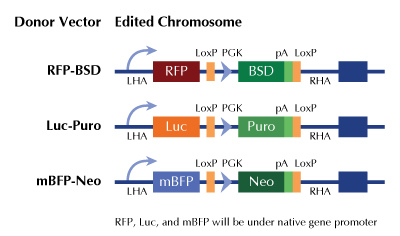PCSK9 Human Gene Knockout Kit (CRISPR)
CAT#: KN220000RB
PCSK9 - human gene knockout kit via CRISPR, HDR mediated
Functional Cassette: GFP-puro Luciferase-Puro mBFP-Neo
HDR-mediated knockout kit validation
USD 1,657.00
4 Weeks*
Specifications
| Product Data | |
| Format | 2 gRNA vectors, 1 RFP-BSD donor, 1 scramble control |
| Donor DNA | RFP-BSD |
| Symbol | PCSK9 |
| Locus ID | 255738 |
| Components |
KN220000G1, PCSK9 gRNA vector 1 in pCas-Guide CRISPR vector KN220000G2, PCSK9 gRNA vector 2 in pCas-Guide CRISPR vector KN220000RBD, donor DNA containing left and right homologous arms and RFP-BSD functional cassette. GE100003, scramble sequence in pCas-Guide vector |
| Disclaimer | These products are manufactured and supplied by OriGene under license from ERS. The kit is designed based on the best knowledge of CRISPR technology. The system has been functionally validated for knocking-in the cassette downstream the native promoter. The efficiency of the knock-out varies due to the nature of the biology and the complexity of the experimental process. |
| Reference Data | |
| RefSeq | NM_174936, NR_110451 |
| UniProt ID | Q8NBP7 |
| Synonyms | FH3; HCHOLA3; LDLCQ1; NARC-1; NARC1; PC9 |
| Summary | This gene encodes a member of the subtilisin-like proprotein convertase family, which includes proteases that process protein and peptide precursors trafficking through regulated or constitutive branches of the secretory pathway. The encoded protein undergoes an autocatalytic processing event with its prosegment in the ER and is constitutively secreted as an inactive protease into the extracellular matrix and trans-Golgi network. It is expressed in liver, intestine and kidney tissues and escorts specific receptors for lysosomal degradation. It plays a role in cholesterol and fatty acid metabolism. Mutations in this gene have been associated with autosomal dominant familial hypercholesterolemia. Alternative splicing results in multiple transcript variants. [provided by RefSeq, Feb 2014] |
Documents
| Product Manuals |
| FAQs |
| SDS |
Resources
Other Versions
| SKU | Description | Size | Price |
|---|---|---|---|
| KN220000 | PCSK9 - human gene knockout kit via CRISPR, HDR mediated |
USD 1,657.00 |
|
| KN220000BN | PCSK9 - human gene knockout kit via CRISPR, HDR mediated |
USD 1,657.00 |
|
| KN220000LP | PCSK9 - human gene knockout kit via CRISPR, HDR mediated |
USD 1,657.00 |
|
| KN420000 | PCSK9 - KN2.0, Human gene knockout kit via CRISPR, non-homology mediated. |
USD 1,657.00 |
|
| GA116832 | PCSK9 CRISPRa kit - CRISPR gene activation of human proprotein convertase subtilisin/kexin type 9 |
USD 1,657.00 |
{0} Product Review(s)
Be the first one to submit a review






























































































































































































































































 Germany
Germany
 Japan
Japan
 United Kingdom
United Kingdom
 China
China
